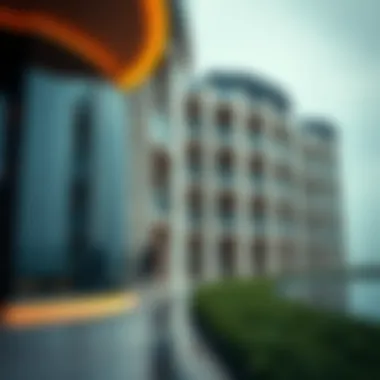Jaber Ali's Impact on Dubai's Real Estate Market


Intro
In the bustling swirl of Dubai's skyline, a transformation unfolds that intertwines with the influence of Jaber Ali. Within this vibrant city, the real estate market has become a dazzling jewel, attracting investors from all corners of the globe. Jaber Ali stands as a pivotal player in this arena, not just a spectator but an architect of change, shaping the landscape with his strategic insights and understanding of market dynamics.
In this article, we’ll traverse the pathways of Dubai's real estate scene, guided by the principles and practices embraced by Jaber Ali. We will explore current market trends, the intricacies of property pricing, and investment avenues that are being tailored for the future. Stakeholders ranging from eager first-time buyers to seasoned investors will find valued insights here, crafted to illuminate the evolving landscape of Dubai's property sector.
Understanding Jaber Ali's Role
Understanding Jaber Ali's role in the Dubai real estate sector is pivotal for both current and prospective investors, as well as buyers and sellers navigating this vibrant market. His influence extends beyond mere transactions; it shapes the very landscape of the industry. Grasping the essence of his impact offers a treasure trove of insights into the broader market dynamics, community developments, and investment strategies relevant today.
Recognizing Ali’s contributions enables stakeholders to comprehend not just who he is, but also how his vision and decisions affect market trends and opportunities. His fingerprints can be seen in various projects that have transformed communities and redefined luxury living in Dubai. Thus, this scrutiny serves as a lens through which one can judge current conditions and forecast future movements within the market.
"In real estate, understanding the people behind the projects is as crucial as the projects themselves."
Background and Profile
Jaber Ali stands as a significant figure in Dubai’s real estate landscape. Born and raised in this melting pot of a city, his journey started with a keen interest in architecture and urban development. This passion morphed into an entrepreneurial spirit that led him to establish his firm, which has played a key role in developing some of Dubai’s most talked-about luxury projects. With a solid educational background, Ali earned credentials from respected institutions that lend legitimacy to his expertise in property development and investment.
What sets Ali apart is not only his acumen but also his deep understanding of the cultural and economic shifts within Dubai. He possesses a radar for emerging trends that many fail to notice until much later. This intuitive grasp of market sentiment helps him forge valuable connections and motivates innovative approaches—traits that are crucial in an ever-evolving industry. His ability to navigate the complexities of real estate transactions speaks to a seasoned professional more than just a businessman.
Key Contributions to Real Estate
Jaber Ali's involvement in Dubai's real estate sector is marked by several noteworthy contributions that have repercussions across the industry. One can't overlook the high-profile developments he spearheaded, which range from luxury residential units to commercial spaces that cater to high-end clientele. Not only have these projects resonated with the affluent, they have also set benchmarks for architectural design and sustainability standards.
- Innovative Community Designs: Ali has championed designs that prioritize community engagement, moving away from isolated living spaces. This includes developments that promote social interaction and communal facilities, arguably vital for urban living today.
- Sustainability Initiatives: Aligning with a global push for sustainability, his projects incorporate eco-friendly practices and materials, ensuring a balance between luxury and environmental consciousness.
- Market Midpoints: Through astute market analysis, Ali identifies gaps within the property market. Such insights lead to developments that do not merely follow trends but sometimes set them—creating spaces that anticipate future needs of residents and investors alike.
In essence, Jaber Ali is not just a player in this market; he is a change-maker, influencing everything from design aesthetics to community norms. His contributions shape buyers' and investors' decisions, making understanding his role indispensable for anyone looking to navigate Dubai's property waters.
Dubai's Real Estate Ecosystem
Dubai's real estate market is a shimmering jewel in the crown of modern commerce. It represents more than just a collection of buildings; it symbolizes the aspirations of investors, expatriates, and domestic buyers seeking refuge in an evolving market. Understanding the ecosystem of this vibrant sector unveils several layers of complexity that contribute to its growth and sustainability. The vitality of Dubai’s real estate ecosystem is rooted in its unique positioning as a gateway between Europe, Asia, and Africa, attracting capital from all over the globe.
The benefits of investing in Dubai's real estate are multifaceted. For prospective buyers and investors, this market offers high returns on investment, tax incentives, and a lifestyle that is both thrilling and cosmopolitan. A major consideration for those aiming to enter this market is the rapid rate of development, which is often reflected in rising property values. Additionally, policies that encourage economic growth, such as 100% ownership laws in designated areas, further enhance the appeal of the Dubai property landscape.
The ongoing transition towards becoming a smart city underscores the emphasis on technology-driven developments. With significant investments in infrastructure and technology, the government of Dubai ensures that the real estate ecosystem remains on the cutting edge, adapting to the advancing needs of its residents and investors alike.
Market Trends Overview
Dubai's real estate market is like a living organism; it continually adapts to external pressures and opportunities. Over recent years, diversifying the economy has led to an expansive shift in market trends. One noticeable trend is the increase in apartment living, particularly among younger professionals and expatriates. This shift towards high-density living derives from a combination of high rental yields and proximity to crucial amenities and employment hubs.
Moreover, luxury properties are seeing a surge in interest, catering to affluent buyers from across the globe. The appeal of high-end villas and waterfront properties remains unmatched. The growing acceptance of remote work has sparked interest in properties further away from traditional business districts, creating a demand for second homes and vacation rentals.
Chasing these trends often leads investors and buyers toward data-driven strategies. Real-time analytics and market insights prove invaluable for making educated decisions. The introduction of metrics measuring demand versus supply has begun to influence developers, keeping them in tune with market needs. If one stays on their toes, these trends can provide lucrative avenues to explore.
Investment Opportunities
With its dynamic socio-economic landscape, Dubai's property market undeniably brims with investment opportunities. The government's strategic initiatives, such as the Expo 2020, have triggered substantial growth, bolstering both commercial and residential spaces. As a result, investors can cherry-pick from various opportunities available in different sectors.
- Residential Properties: The rising population drives a steady demand for housing. Investing in emerging neighborhoods often brings fruitful returns in the long term, especially as infrastructure developments enhance accessibility.
- Commercial Real Estate: Office spaces and retail establishments, especially in newly developed zones, can yield significant returns as businesses flock to Dubai. The ongoing demand for flexible workspaces showcases the potential in this area.
- Vacation Rentals: With tourism becoming a lynchpin of Dubai's economy, properties aimed at short-term rentals promise robust income streams. Compared to other major cities, the regulations favoring tourists highlight the potential for savvy investors.
- Mixed-Use Developments: Projects combining residential, commercial, and leisure spaces are gaining traction. These developments, such as those seen in areas like Dubai Marina or Downtown Dubai, offer diverse income streams, reducing the risk profile for investors.
By continually analyzing market conditions and aligning with upcoming trends, investors stand to capitalize on Dubai's real estate ecosystem effectively. Being attentive to fluctuations in demand, future infrastructure developments, and global investment flows will further anchor their positioning in this captivating marketplace.
"Investing in Dubai's real estate today is about laying the foundation for tomorrow’s wealth; the landscape may change, but opportunity persists at every turn."
For further insights, consider exploring resources from Dubai Land Department or Global Property Guide. These platforms offer detailed analyses and updates that can inform potential investors of current trends and forecast developments.


Community Developments Influenced by Jaber Ali
Community developments are pivotal in Dubai, driving not just real estate growth but also enhancing the overall quality of life for residents. Jaber Ali has played a central role in fostering these developments, creating spaces that cater to families, businesses, and tourists alike. His vision extends beyond mere structures; it encompasses vibrant neighborhoods that reflect Dubai’s spirit of innovation and progress. As we explore this dimension of his influence, we can gain insights into how thoughtful planning and execution can yield significant benefits for the community and stakeholders involved.
Highlighting Key Projects
Jaber Ali's portfolio showcases several key projects that exemplify his impact on community development. One standout is the Dubai Creek Harbour, a waterfront neighborhood positioning itself as a global tourist destination while maintaining a community feel. This project blends residential, commercial, and cultural spaces, nurturing a harmonious lifestyle. The commitment to sustainability in its design—like renewable energy sources and green spaces—resonates well with today’s environmentally conscious buyers.
Another notable endeavor is the Dubai Marina Walk, which comprehensively transformed the area around the marina into a bustling hub featuring shops, dining options, and recreational areas. This space not only captured the essence of urban living but also provided a blueprint for future developments, marrying luxury with accessibility.
In addition, the creation of Al Quoz Creative Zone presents an innovative spin to community development. This area caters to art, culture, and creativity, fostering a unique ecosystem for artists and businesses in the creative sector. It illustrates Jaber Ali's awareness of niche markets and his ability to develop spaces that cater to specific demographics.
Analyzing Community Impact
The ripple effects of Jaber Ali's developments extend well beyond the immediate vicinity of his projects. For instance, the success of developments like Dubai Creek Harbour has stimulated local economies, attracting new businesses that contribute to job creation. Furthermore, with the growth of residential areas, there has been a noticeable uptick in community engagement activities, such as events that bring residents together, fostering camaraderie and a sense of belonging.
The infrastructure improvements accompanying these developments cannot go unnoticed either. Enhanced transportation networks, better public amenities, and increased accessibility stand testament to Jaber Ali's understanding that community development must enhance connectivity. Consider, for instance, the increased accessibility for commuters and tourists, facilitated by strategic location choices that connect people and places with ease.
However, it’s prudent to acknowledge the challenges faced. Rapid growth can lead to strains on resources and infrastructure. Balancing development with sustainability and community needs remains a critical consideration for stakeholders.
"The responsibility of developers transcends just bricks and mortar; it's about nurturing the communities we build."
For more on how urban development shapes community dynamics, you can visit Wikipedia or Britannica.
By understanding the comprehensive landscape that Jaber Ali has helped to create, stakeholders can make informed decisions that align with the growing needs of Dubai's diverse population.
Market Dynamics in Dubai
Understanding the market dynamics in Dubai's real estate landscape is crucial for anyone involved in property transactions—whether it be investors, buyers, sellers, or real estate agents. The real estate market in Dubai is a bustling environment, characterized by a unique blend of local and international influences. This dynamic arena is shaped by numerous factors, including supply and demand, economic conditions, and the role of foreign investments. Each of these elements plays an instrumental role that can significantly alter market conditions, creating both opportunities and challenges for stakeholders involved.
Supply and Demand Factors
One cannot delve into the intricacies of Dubai's real estate market without addressing the fundamental principles of supply and demand. These factors operate like a seesaw, constantly adjusting to shifts in the economic landscape. On one side, supply encompasses the availability of properties—residential, commercial, or mixed-use spaces. In recent years, there has been a noteworthy increase in property developments, spearheaded by Jaber Ali’s impact through his various projects.
The market has witnessed an impressive rise in housing supply, with neighborhoods like Dubai Marina and Downtown Dubai experiencing substantial influxes of new residential units. However, despite this growth, demand has often kept pace. People from all walks of life are seeking homes in this vibrant city, driven by lucrative job opportunities and high-quality living standards. The resulting demand creates tension, often leading to price fluctuations that can bewilder even seasoned investors.
- Key supply factors include:
- The volume of new developments initiated by both private and public sectors.
- Availability of land and infrastructure improvements.
- Market perceptions regarding property values.
Conversely, on the demand side, various drivers add complexities:
- High-profile expatriates and professionals drawn to Dubai for opportunities in sectors like finance, technology, and hospitality.
- Increased interest from first-time home buyers seeking stable environments.
- The allure of Dubai’s lifestyle, often likened to a melting pot of cultures and experiences.
Striking a balance between these forces is key to navigating the nuances of the market.
Role of Foreign Investment
The role of foreign investment in Dubai's real estate sector cannot be overstated. It serves as the lifeblood of market activity, enhancing infrastructure and accelerating development processes. Dubai has long positioned itself as a gateway to the Middle East, attracting investors from all corners of the globe. The favorable policies instituted by the emirate, such as long-term residence visas and ownership possibilities for expatriates, have only fueled this trend further.
A considerable share of real estate transactions is attributed to foreign buyers, particularly from regions like Europe, Asia, and Africa. This demographic shift influences property prices and shapes market trends in profound ways. Beyond mere purchases, foreign investment acts as a catalyst for innovation and design, often leading to the creation of luxury residential projects and state-of-the-art commercial spaces.
As we navigate the currents of foreign capital flowing into Dubai, some essential elements come to light:
- The ease of investing in real estate is often enhanced by robust regulatory frameworks and transparent legal systems.
- Events like Expo 2020 have driven awareness and interest, further stimulating international purchases.
- Foreign investors often look for returns that exceed those available in their home countries, placing pressure on the property values in Dubai.


Navigating the Buying Process in Dubai
Navigating the buying process in Dubai real estate is akin to finding your way through a bustling bazaar, where each stall offers unique opportunities and challenges. Understanding this process is crucial for investors, buyers, and anyone interested in making a mark in Dubai's dynamic property landscape. The regulations, market trends, and financial considerations can often feel overwhelming, but knowing what to expect can significantly ease this journey.
The buying process in Dubai isn't merely transactional; it’s a gateway to new possibilities. With each step, from legal processes to financing options, an investor not only secures property but also taps into the city's ever-evolving potential. The diverse market, particularly influenced by figures like Jaber Ali, adds layers of complexity and opportunity that are essential to comprehend.
Legal Considerations for Buyers
One cannot overlook the legal landscape when purchasing property in Dubai. Legal considerations play a significant role and understanding these can prevent costly pitfalls. Firstly, prospective buyers must be aware of the ownership laws, as they differ significantly depending on the property type and location. For example, freehold properties allow full ownership, whereas leasehold properties only permit a temporary right of use.
Notable legal aspects include:
- Title Deed: It is essential that the property has a clear title deed. It certifies legal ownership and prevents future disputes.
- Property Registration: Owning property in Dubai necessitates registration with the Dubai Land Department. This crucial step ensures all legal formalities are fulfilled.
- Fees and Taxes: Be prepared for various fees, such as a 4% transfer fee on the property value, plus additional costs like registration fees and to compensate agents.
- Buyer Protection: Familiarizing oneself with the real estate laws of Dubai, particularly those aimed at protecting buyers, can provide extra peace of mind.
A common piece of wisdom among seasoned investors is to engage legal professionals with local expertise. After all, navigating these waters without guidance might lead to unforeseen headaches down the line.
Financing Options Explained
Understanding financing options in Dubai can be the make-or-break decision in real estate investing. Fortunately, the financing landscape has evolved. There are myriad options available, allowing buyers to tailor their investments to their financial situations.
Key financing avenues include:
- Mortgage Options: Many local and international banks offer mortgage products varying from traditional loans to Islamic financing. It’s crucial to shop around for the best rates and terms.
- Deposit Requirements: Most lenders ask for a down payment, which can range from 20% to 40% of the property value depending on the buyer's residency status and the type of property.
- Payment Plans: Developers in Dubai often provide attractive payment plans. These can spread costs over several years, often linked to construction milestones, which can be particularly beneficial in new developments.
- Cash Purchases: It’s important to note that cash buyers may have a sharper edge in negotiations since they can speed up the purchasing process considerably.
In essence, a thorough understanding of financing in Dubai not only enables buyers to make educated decisions but also positions them to negotiate better terms. As the market continues to flourish, those equipped with the right knowledge will find it more feasible to navigate and thrive in this impressive real estate landscape.
Investing in Dubai's real estate without understanding the legal and financial aspects is like sailing without a compass; it's crucial for successful navigation.
Strategies for Sellers in Dubai's Market
Navigating the selling process in Dubai’s competitive real estate market requires more than just listing a property. Strategies for sellers can make the difference between a quick sale and a property that lingers on the market. By adopting tailored approaches, sellers can optimize their chances of achieving favorable results, which is crucial in a rapidly shifting landscape influenced by both local and global economic factors.
Effective Marketing Techniques
When it comes to marketing a property in Dubai, creativity and strategy are key. It’s not just about putting a ‘For Sale’ sign and waiting for buyers to come knocking. Here are some effective marketing techniques:
- Utilizing Online Platforms: Utilize platforms like Property Finder, Bayut, and even social media channels to showcase listings. Pictures speak louder than words—high-quality photos and virtual tours can enhance a listing's appeal significantly. How's this for a pitch? A breathtaking drone shot gives potential buyers a bird's eye view of not just the property, but the surrounding community.
- Targeted Advertising: Consider employing digital marketing strategies, such as targeted advertisements on social media and Google Ads. This helps reach potential buyers that fit the property's profile, boosting exposure.
- Open House Events: Hosting open house events creates excitement and urgency among interested buyers. Offering refreshments or exclusive previews can create a welcoming atmosphere that entices potential buyers to visualize themselves in the space.
- Staging the Property: A well-staged home can significantly impact buyer perception. Neutral colors and minimal décor allow buyers to envision their style. The goal is to allow the property to shine without personal clutter clouding the vision.
"A house well-staged is a house halfway sold."
In a city like Dubai, where lifestyle often influences purchasing decisions, marketing can’t be a one-size-fits-all approach.
Pricing Metrics and Analysis
Setting the right price is crucial in real estate sales, especially in a vibrant market like Dubai. It can be the thin line between an instant sale or a stagnant listing. Understanding pricing metrics and analysis includes:
- Comparative Market Analysis (CMA): This entails evaluating similar properties that have recently sold in the area. By assessing their sale prices, sellers can gauge where their property stands and make adjustments accordingly. It’s practical and takes guesswork out of pricing.
- Appraisal Values: Enlisting professional appraisers provides an unbiased opinion on the market value of a property. This can be beneficial in avoiding overpricing or underpricing, both of which can harm the seller’s position.
- Market Trends: Keeping an eye on wider market trends, including economic indicators, demand-supply statistics, and buyer demographics, helps sellers identify optimal pricing windows. For example, if there's a spike in demand for a certain neighborhood, it may be wise to reflect that in the pricing.
- Cost-Per-Square-Foot Analysis: By understanding how much per square foot similar listings are being sold for, sellers can better position their own properties. This effective metric makes comparisons easier amidst a pool of options.
In summary, successful selling in Dubai's market hinges on leveraging effective marketing techniques alongside astute pricing strategies. Sellers who remain informed and adaptable can harness the many opportunities within this vibrant real estate landscape.
Role of Technology in Real Estate
In the ever-evolving landscape of Dubai's real estate market, technology emerges as a vital force. It shapes industry practices, streamlining processes, enhancing communication, and creating opportunities for all stakeholders involved. Understanding its significance becomes imperative for investors, buyers, sellers, and agents alike as they navigate this multifaceted terrain. The seamless integration of technology not only boosts efficiency but also improves overall experiences in property transactions.
Digital Platforms for Buyers and Sellers


Digital platforms revolutionize how real estate transactions occur. With the rise of websites and apps like Property Finder and Bayut, buyers and sellers are empowered like never before. These platforms serve as one-stop shops for listings, neighborhood data, and price comparisons—making the search process more accessible and less daunting.
- User-Friendly Interfaces: Most platforms offer easy navigation, filtering options based on preference, which allows buyers to dig deeper into their ideal properties.
- Virtual Tours: With the use of augmented reality, buyers can tour properties from the comfort of their homes. This is particularly advantageous for international buyers who cannot visit in person.
- Data Analytics: Sellers can leverage insights generated by these platforms to adjust their marketing strategies. Understanding buyer behavior helps in creating tailored approaches that resonate with potential clients.
The importance of effective communication tools cannot be overstated. Many digital platforms incorporate chat functionalities—allowing buyers to directly communicate with sellers or their agents, thereby speeding up the decision-making process.
Emerging Technologies and Trends
As technology continues to advance, several trends are surfacing that have profound implications for the real estate sector. Each innovation paves the way for smarter, more efficient transactions that benefit the marketplace at large.
- Blockchain Technology: The introduction of blockchain offers secure, transparent transactions, drastically reducing fraud risks associated with property dealings. Its decentralized nature allows for immutability, meaning once a transaction is recorded, it cannot be altered without consensus.
- Big Data: The assimilation and analysis of vast amounts of data help stakeholders make informed decisions. Real-time analytics can reveal emerging market trends, customer preferences, and competitive analysis, providing an upper hand in the real estate game.
- Artificial Intelligence: AI enhances customer service through chatbots, predictive analytics, and machine learning algorithms that learn from user behavior. Such advancements can forecast market shifts and customer needs more accurately than traditional methods.
- Sustainability and Smart Tech: The growing demand for sustainable properties leads to technological innovations in construction. Smart homes equipped with IoT (Internet of Things) devices reduce energy consumption and create an environment that's both futuristic and environmentally friendly.
"By embracing technology, Dubai's real estate sector can remain competitive on a global scale, ultimately benefiting investors, buyers, and sellers alike."
Through adapting to these technological shifts, not only does the real estate landscape become more dynamic, but it also fosters a more engaged and informed community of stakeholders. As Jaber Ali's influence entwines with these advancements, the integration of technology in the sector marks a significant chapter in Dubai's real estate narrative.
Investment Risks and Considerations
Investment in real estate, particularly in a vibrant market such as Dubai, brings not only opportunities but also risks that demand careful consideration. Understanding these risks is essential for investors keen on making informed decisions. It's one thing to see a shiny new skyscraper or a pristine villa, but the underlying factors driving those investments are often complex and multifaceted. This section sheds light on the various investment risks associated with Dubai's real estate landscape, emphasizing the importance of knowledge for all stakeholders involved.
Market Volatility and Economic Factors
The real estate market in Dubai has shown remarkable resilience, yet it remains vulnerable to fluctuations tied to broader economic conditions. For instance, during periods of economic downturn, property values might see substantial declines. Investors should be particularly aware of the following:
- Global Economic Climate: External factors such as global oil prices and national economic policies of key trading partners can impact Dubai's economy. If oil prices drop, for example, it may lead to decreased spending in real estate.
- Investor Sentiment: The emotional side of investing can’t be ignored. When uncertainty looms, it may cause hesitancy among potential buyers, leading to a reduction in demand and, subsequently, declining property prices.
- Interest Rates: Rising interest rates can hike the cost of borrowing. This can deter potential buyers and contribute to lower sales activity. Keeping a close eye on trends in monetary policy can provide valuable insights for real estate investors.
"It's not just about the bricks and mortar; the pulse of the economy can make or break your real estate investment."
Zoning and Regulatory Changes
Navigating the regulatory landscape is crucial when investing in Dubai's property market. Regulations can change rapidly, affecting everything from property ownership rights to construction permits. Here’s what investors must keep in mind:
- Zoning Regulations: Local authorities constantly update zoning laws to control land use. An unexpected change could alter plans for a property development project or affect the area’s desirability.
- Ownership Laws: Changes in ownership regulations, especially those concerning foreign investors, can shift the allure of certain neighborhoods. For instance, if a new policy restricts foreign ownership in a prime area, it could drastically affect property values.
- Taxation Policies: An emerging shift in taxation can create both challenges and opportunities. Changes in property tax policies affect the bottom line for investors and homeowners alike. Staying informed about local tax scenarios can help mitigate unexpected costs.
Ultimately, analyzing these factors armed with robust research and guidance will empower investors to build portfolios that not only stand the test of time but also adapt to the ebbs and flows of the market. Investors should continually seek insights from reliable resources like Dubai Land Department or browse through platforms that track real estate trends such as Property Finder.
Understanding potential investment risks isn't just about avoiding pitfalls; it's about harnessing knowledge to make savvy decisions that pay off in the long run.
Future Outlook for Dubai's Real Estate Market
The future of Dubai's real estate market holds particular significance given the city's rapid development and changing dynamics. Investors, agents, buyers, and sellers must pay close attention to forthcoming trends as these will influence critical decision-making in the real estate sector. For those looking to capitalize on opportunities or mitigate risks, understanding the direction of the market becomes not just beneficial but essential.
Several factors come into play when contemplating the future of this vibrant market, including economic conditions, demographic shifts, and regulatory changes. These elements are intertwined, collectively shaping the real estate landscape. Investors have to be keen-eyed, sifting through these layers to predict market movements accurately. Here’s what to keep an eye on.
Projected Trends and Developments
- Increased Urbanization: Dubai continues to grow, with more people flocking to the city for work and lifestyle. This urban influx will likely drive demand for residential and commercial properties.
- Sustainable Developments: There is a growing emphasis on sustainability in construction and property management. Developers may increasingly adopt green building practices, appealing to environmentally conscious buyers and investors.
- Digital Transformation: Technology will keep reshaping the market. Virtual reality and smart home technologies are becoming commonplace, influencing how properties are marketed and sold. Buyers looking for properties will expect modern amenities and tech integration, thus increasing the property value.
- Regulatory Reforms: Anticipated changes in regulations may encourage foreign investments. Streamlining processes and reducing barriers could offer new opportunities for outside investors.
- Shifts in Buyer Demographics: The buyer landscape is also projected to evolve. Younger, tech-savvy buyers who prioritize convenience and smart technology might dominate, impacting the types of properties in demand.
Potential Future Influencers
Various individuals and entities could have a substantial impact on the future of Dubai's real estate market:
- Jaber Ali: His vision and strategic initiatives might continue to drive positive growth in Dubai's property sectors. If he maintains his involvement, his influence could foster innovations and developments that resonate with current market needs.
- Government Policies: Local government decisions will play a pivotal role. Initiatives aimed at diversifying the economy could result in a more resilient real estate market.
- Tech Innovators: As startups and established companies introduce new technologies into the field, they may redefine property transactions and management, influencing how buyers and investors approach the market.
- Global Economic Influences: Factors like oil prices and international relations might directly affect Dubai's appeal to foreign investors, thus impacting the local market.
"The horizon of Dubai's real estate market looks promising, provided stakeholders remain vigilant and adaptable to the shifting sands of economic and technological landscapes."
By delving into these projected trends and understanding the potential influencers, all parties engaged in Dubai's real estate sector can better navigate the complexities and seize upcoming opportunities. With Jaber Ali's ongoing influence and the attention to future developments, the region is poised for a vibrant real estate experience.
For more insights on Dubai's market trends and community growth, consider visiting sources like Wikipedia or articles on Britannica. Recommendations for navigating regulations and policies can often be found on official government websites or educational institutions like Harvard University.
Stay informed, adapt strategies, and you may find success in the ever-evolving Dubai real estate landscape.















